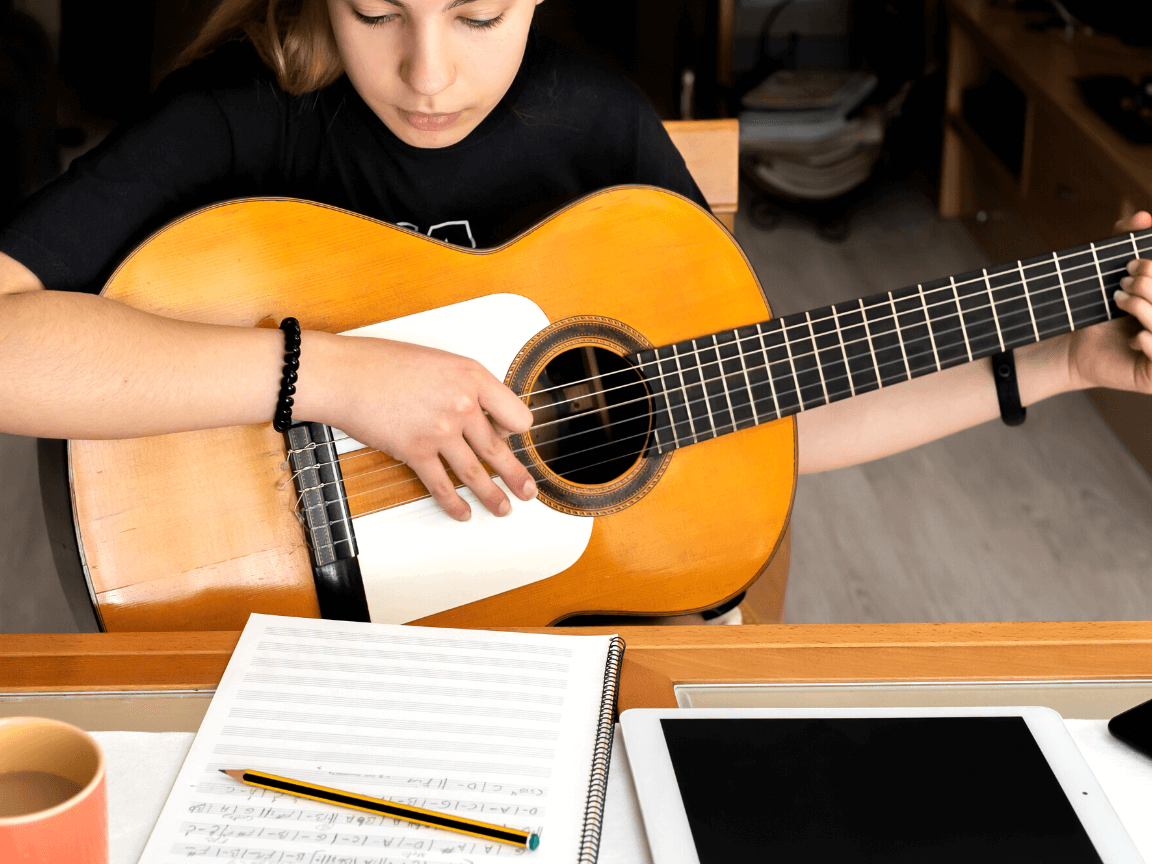If you’re a music enthusiast who has been considering taking up guitar lessons, you may be wondering if they’re worth the effort and investment.
After all, learning to play an instrument can be a time-consuming and expensive endeavor.
In this article, we’ll look at the pros and cons of taking guitar lessons, and provide some tips on how to make the most of your experience.
We’ll also discuss the various types of lessons available, and offer advice on finding the right teacher for you, both online or in-person.
Table of Contents
- Are guitar lessons worth it?
- Advantages of Taking Guitar Lessons
- Disadvantages of Taking Guitar Lessons
- Types of Guitar Lessons
- How to choose the right guitar lessons?
- Preparing for Your First Guitar Lesson
- How long does it realistically take to learn guitar?
- What is the success rate of learning guitar?
- Are 30 minute guitar lessons worth it?
- What is the hardest thing to learn in guitar?
- How many hours a day should you practice guitar beginner?
- Can you get good at guitar in a year?
- Final thoughts
Are guitar lessons worth it?
Yes, guitar lessons are worth it. Taking lessons from a qualified instructor can help you learn faster, develop better techniques, and stay motivated. With the right instructor, you can also learn the theory and songwriting skills needed to become a better musician. In addition, having regular lessons can help you stay focused and actually make progress on your goals.
Also, learning to play with a teacher can be more enjoyable than working alone.
This is because you have someone to motivate and encourage you, as well as answer any questions or troubleshoot problems that arise.
You can also get feedback on your playing before you develop bad habits, which will help make the learning process easier in the long run.
Plus, when you take guitar lessons, you can often join a community of other musicians who can support your progress and provide valuable feedback.
Finally, taking guitar lessons can be a great way to meet new people who share the same interests as you.
This can open up opportunities for collaborations and performance opportunities that would otherwise not be available.
Advantages of Taking Guitar Lessons
Taking guitar lessons has a number of advantages that can help you become a better musician.
Let’s explore some of these advantages to help you decide if guitar lessons are right for you.
– It improves your playing technique
The first thing that guitar lessons can do is help you learn the basics of playing technique.
A good teacher will show you how to play correctly so that you don’t develop bad habits or make mistakes when playing.
Lessons also provide an opportunity to practice and refine your playing style, so that your sound becomes more professional and polished.
On top of that, learning the basics of playing technique can help you master different genres, such as classical, jazz, blues, and rock, which can open up a whole new world of musical possibilities.
– It will give you motivation to play
Sometimes it’s hard to stay motivated when learning an instrument so taking guitar lessons can provide you with the motivation and discipline that you need to continue playing and improve your skill level.
Your teacher will also have useful tips and advice on how to practice effectively, which can help you make the most of your time with them.
When we first start to learn something new, it can be difficult to keep going but having a teacher and other students around can help to keep you inspired and focused.
Aside from that, having a set time and place to practice can help build a routine, which is important if you want to make progress with your playing.
– You’ll get access to professional guidance
When you take guitar lessons, you’ll have access to professional guidance from a qualified teacher who can help you work towards your goals.
Your teacher will be able to provide feedback on your playing and identify areas where you need to improve so that you can become the best musician that you can be.
They’ll also be able to give advice on how to overcome any obstacles that you might be facing in your playing, as well as provide support and encouragement when you’re feeling lost or discouraged.
If you choose to learn by yourself, you won’t have access to this kind of professional advise so much, so taking lessons can be a great way to get the most out of your playing.
– Learning musical theory is not a bad idea
Many guitarists overlook musical theory but having a basic knowledge of it can be extremely useful for improving your playing.
Your teacher will be able to explain and demonstrate different concepts, such as chord progressions and scales so that you can understand how they work in relation to the music you’re playing.
This understanding allows you to explore different sounds and arrangements, which can open up a whole new world of musical possibilities.
On the other hand, if you try to learn the theory by yourself, it can be confusing and difficult to understand.
So taking lessons is a great way to gain an understanding of music theory in a more structured and enjoyable way.
– It helps you learn quickly
When all else fails, taking guitar lessons can help you learn quickly.
Rather than trying to figure out things on your own, a good teacher will be able to show you the correct way of doing things and provide exercises that are tailored to your skill level so that you can make progress in your playing.
In addition, having someone watching your technique and providing feedback means that you’ll be able to identify and correct any mistakes before they become habits.
In the long run, this can save you a lot of time and frustration, since you won’t have to relearn things that you should have done correctly in the first place.
Disadvantages of Taking Guitar Lessons
Now that you know some of the benefits of taking guitar lessons, it’s also important to consider their potential drawbacks.
Let’s have a look at some of the possible disadvantages of taking lessons:
– It costs you some money
One of the major disadvantages of taking guitar lessons, and the one that people often focus on, is the cost.
Depending on where you live and who your teacher is, guitar lessons can be quite expensive, so it’s important to consider whether or not you can afford them before committing to a course of study.
Generally, a decent instructor will charge anything from $20 to $50 per hour, which can add up if you’re taking lessons several times a week.
Also, if you’re planning on taking a more intensive course, such as one-on-one lessons or something more specialized, then the cost will inevitably be higher.
– The time commitment is high
Another disadvantage of taking guitar lessons is the time commitment that it requires.
You’ll have to make sure that you can fit in your lessons around your other commitments, such as work and family, which can be quite challenging if you’re already busy.
Also, depending on the structure of the course, it may require several months or even years to reach a certain level of proficiency with your playing.
If you’re serious about playing the guitar, then this level of dedication is essential, but it’s something that you should bear in mind before signing up for lessons.
Plus, you must practice regularly on your own in order to make the most of your lessons, so this adds even more time commitment.
– You might be unable to learn at your own pace
Some people find that taking guitar lessons can be quite restrictive since you’ll have to follow the course structure and pace set by the teacher.
This can make it difficult to learn at your own pace or focus on particular areas of playing that you’re interested in exploring.
In addition, if the teaching style isn’t quite right for you, then it can be a very frustrating experience and make the process of learning more difficult.
Now, this depends on the teacher and whether the course is online or in-person, but it’s something that you should keep in mind when choosing a course or instructor.
– You might have to travel for lessons
If you’re taking guitar lessons in person rather than online, then you may have to factor in the cost and time of traveling to and from your instructor’s office or studio.
This can be quite inconvenient for some people.
Especially if you don’t live close to your teacher or if you have other commitments.
If you’re considering taking guitar lessons in person, then it’s important to think about how much traveling is involved and how this might affect your ability to attend weekly classes.
– You can become too reliant on a teacher
Finally, it’s important to remember that taking guitar lessons can sometimes lead to you becoming too reliant on your instructor.
In other words, if you’re not regularly practicing or challenging yourself with new techniques and ideas, then relying solely on a teacher can be detrimental to your progress as a musician.
Therefore, it’s important to ensure that you’re taking the initiative and pushing yourself outside of your lessons, in order to maximize your progress.
This means taking the time to practice, explore different techniques and styles, experiment with writing music, and so on.
Types of Guitar Lessons
– Private Lessons
Private lessons are the most common type of guitar lessons, but in my opinion, have declined in popularity over the years.
They involve one-on-one instruction with a guitar teacher, usually at the student’s home or in a studio setting.
What I like about these lessons is that you typically get personalized attention from your teacher and can work on the topics of interest to you, at your own pace.
The downside is that they can be more expensive than group lessons, and it’s harder to find a great teacher in many areas.
Also, it can be difficult to schedule lessons around both your and your teacher’s busy schedules, so this type of lesson may not be ideal for those with irregular schedules.
– Online Lessons
Online guitar lessons are essentially any course that you see on the internet, usually offered as video lessons.
They’re convenient because you can access them from any computer, and many are reasonably priced or even free of charge.
You can find two different types I would say, the one where the teacher is live or the pre-recorded video lesson.
The downside to these is that they lack the personal feedback and guidance of private lessons, as you can’t ask questions or interact with your teacher in real-time.
Plus, it takes a lot more self-discipline to actually practice when there’s no one around to enforce it.
On the other hand, you can access online lessons anytime and anywhere, so it’s perfect for those with a busy schedule or those who can’t find a local teacher.
– Group Lessons
Group lessons are more affordable than private lessons, but still, provide the opportunity to ask questions and get feedback from your teacher.
They usually take place in a studio or classroom setting with multiple students learning at once.
What I like about these is that you can learn from other students around you, and it’s often more fun and motivating when there are other people in the room.
The downside is that everyone learns at a different pace, so you may find yourself stuck waiting for your peers to catch up or feeling rushed through topics.
Also, since there are multiple students involved, teachers tend to focus on teaching the group as a whole, rather than addressing each student’s individual needs.
– Ensemble Lessons
Ensemble lessons involve multiple players from different instruments coming together to learn music in a collaborative environment.
This is my least favorite type of lesson, as it can be difficult to focus on your own instrument when there are others around you.
With that said, they can be great for those who want to learn how to play with a band or in an ensemble setting, and the collaborative aspect can foster creativity.
And again, since you’re learning with other students, the cost is usually lower than private lessons.
But overall, I’m not a fan of these types of lessons and don’t recommend them to most beginners.
– Workshop Classes
I would put workshop classes into a separate category, as they’re not necessarily guitar lessons.
These are usually one-time or short-term classes that focus on specific topics such as blues guitar, jazz guitar, songwriting, and so on.
They can be great for those who want to learn more about a certain style of playing or just need some guidance and advice.
The downside is that once the class is over, you’re on your own until the next one comes around.
Also, since they tend to be more expensive than other types of lessons, they may not be the best choice if you’re just starting out.
– Jam Sessions
Lastly, I would include jam sessions in this list, even though they’re not technically lessons.
These are opportunities to join other musicians and just play music together, either informally or as part of a band or ensemble.
Playing with others is an incredibly valuable experience, as it gives you a chance to practice your skills in a real-world setting.
Me, personally, I love jam sessions because they’re so much fun and can be a great way to make new friends, and it’s really how my guitar playing improved the most.
The downside is that you may not get any real guidance and feedback from your peers, so it’s important to be mindful of what you’re playing and practice good form.
In addition to that, hopefully whoever you’re jamming with is better than you or at least on the same level, so you can both benefit from each other’s skills.
Otherwise, you may find yourself stuck in a rut of playing the same old songs over and over.
How to choose the right guitar lessons?
Learning the guitar can be a challenge for beginners, so finding lessons that cater to your skill level is essential.
Let’s look at some tips to help you choose the right guitar lessons:
– Consider your skill level and be honest about it
The first step in choosing the right guitar lessons is to honestly assess your skill level.
Are you a total beginner or are you more experienced? Knowing what level of skill you have will help narrow down the selection of lessons available.
After that, you can start to look for guitar lessons that match your skill level.
For example, if you’re more experienced, you can look for advanced lessons that cover new techniques and concepts or even look for a mentor who can provide personalized guidance.
On the other hand, if you’re a beginner, look for lessons that introduce the basics and provide plenty of practice time so that you can develop your skills.
– Take a look at your budget
Guitar lessons can range in cost depending on the length of the course and the type of instructor.
If you’re on a budget, look for courses that offer flexible payment options or even free courses.
Also consider if there are any extra costs such as purchasing new guitar strings, picks, etc., as these can quickly add up.
If you have less than $100 to spend, look for online courses as they’re often more affordable than in-person lessons.
But, if money is not an issue, you can always opt for private lessons from a qualified instructor on a daily or weekly basis.
– Make sure it has the right support system
There’re many programs out there that offer guitar lessons, but not all of them provide the right support system.
Look for programs that have a dedicated support team to answer any questions you have during your learning process or that provide additional resources such as video tutorials and audio recordings.
Having a support system in place will ensure that you’re getting the most out of your lessons and will help you stay motivated and on track.
Also, if you’re somebody who needs the motivation to practice, look for a program that has an instructor who can provide regular feedback and guidance.
This type of support will help you stay focused and make the most out of your practice time.
– Do as much research on the program as you can
You should also take the time to research each program you’re considering, especially if it’s an online course.
Read reviews from past students and make sure that the instructor has a good reputation in the guitar community.
Also, look for programs that offer multiple levels so that you can advance your skills as you progress and that provide a variety of lesson plans that focus on different styles and genres.
Finally, make sure the program is up to date with the latest trends and techniques in guitar playing.
Even though this industry is not as fast-paced as other fields, it’s still important to keep up with new developments and changes in the guitar-playing world.
Preparing for Your First Guitar Lesson
Okay, so you found a guitar teacher and you’re ready to get started!
Before your first lesson, there are a few things you need to do in order to prepare.
First, make sure you have all the materials needed for your lesson, which includes having:
- A guitar (acoustic or electric).
- A tuner and/or electronic metronome.
- Extra set of strings.
- A music stand.
- Picks (if using an electric guitar).
- Pencils, staff paper, and a notebook.
Second, be familiar with the basics of guitar playing or at least have some idea of how it works.
In other words, ideally, you don’t want to show up not knowing how to hold your guitar, tune it, or read chord diagrams/tabs.

Aside from all this, I would say have an idea of what kind of music you’d like to learn and have a few songs you’re interested in learning so that you can get the most out of your lesson.
Also, be able to communicate well with your teacher about what you’d like to learn and ask questions if something isn’t clear to you.
This will not only make your lesson more enjoyable but also help you become a better guitarist faster, which is the goal!
How long does it realistically take to learn guitar?
Learning guitar is a very rewarding experience, but it does take time and effort to get good at it.
Depending on how much time you put into it, it can realistically take anywhere from a few months to a few years to learn guitar.
If you practice consistently and make sure to learn the basics, such as chords, scales, and strumming patterns, you can make significant progress in a few months.

However, if you want to become a more advanced player, it can take years of practice and dedication.
It is important to remember that learning guitar is a process and it takes time to become a proficient player.
Additionally, it is important to find a teacher or mentor who can help you develop your skills and provide guidance.
With the right combination of practice, dedication, and guidance, you can become a great guitarist in a relatively short amount of time.
What is the success rate of learning guitar?
The success rate of learning guitar is highly dependent on the individual; it takes dedication, practice, and patience to become proficient at the instrument.
It is also important to set realistic goals and to practice regularly so that if you stay consistent you can start to see results fast.

However, mastering the instrument can take years.
It is important to find an instructor or mentor who can provide guidance and feedback throughout the learning process.
Additionally, it is extremely useful to find a community of guitarists to learn from and share experiences with.
This is because it helps to create a supportive environment where you can get encouragement and feedback.
Are 30 minute guitar lessons worth it?
When it comes to deciding if 30 minute guitar lessons are worth it, it really depends on your individual goals and needs.
If you are a beginner who is just starting out, 30 minute lessons can be a great way to get a feel for the basics and get comfortable with the instrument.

On the other hand, if you are an advanced player looking to take your playing to the next level, you may find that 30 minutes is not enough time to really delve into the complexities of the instrument and make meaningful progress.
Ultimately, it’s important to consider your own skill level and what you hope to achieve with the lessons.
If you’re looking for a way to get started on the guitar without making a big commitment, then 30 minute lessons can be a great option.
However, if you’re looking to really master the instrument, you may want to consider longer lessons.
What is the hardest thing to learn in guitar?
The hardest thing to learn in guitar is probably the technical aspects of playing.
What this includes is mastering the proper hand position, learning to read music, and understanding the fundamentals of music theory.
It can take a lot of practice and dedication to get the hang of these things, and even then it can take a while to really feel comfortable playing.

Additionally, learning to play more complex pieces can be difficult, as it requires a great deal of coordination between both hands and a good understanding of the music.
It can be very frustrating to try and learn a piece and not be able to get it right, but with enough practice and patience, you can get there eventually.
Also, another hard thing to learn on the guitar I would say was the ability to improvise.
Improvisation is an important skill for any musician and requires a lot of practice to become proficient.
It can take quite some time before you’re able to really hear the notes in your head and play them on the guitar, but it’s well worth the effort when you finally get there.
How many hours a day should you practice guitar beginner?
For a beginner guitar player, it is important to practice regularly, but it is also important to not overdo it.
Generally speaking, a beginner should aim to practice for about 1-2 hours a day, 4-5 days a week.
This will give you enough time to learn the basics and build up your skills, without getting overwhelmed or burnt out.
During your practice sessions, focus on the fundamentals, such as scales, chords, and strumming patterns.
Also, make sure to take breaks and switch up your practice routine to keep it interesting and enjoyable.
Can you get good at guitar in a year?
It is certainly possible to get good at guitar in a year, depending on how much time and effort you are willing to put in.
You must remember, though, that everyone learns at a different pace, so it is important to be patient and consistent with your practice.
To get good at guitar in a year, you should aim to practice at least an hour a day, at the very least, breaking up your practice into smaller chunks throughout the day can help you achieve this as well.
And again, as I mentioned, is also important to focus on the fundamentals, meaning the scales, chords, and how they relate to each other.
On the other hand, it is helpful to find a teacher or mentor to help guide you in the right direction and provide feedback on your progress.
This can come in the shape of a friend, family member, online tutor, or local music school, but even though it’s not necessary, it can be beneficial in the long run.
Final thoughts
Making the decision to take guitar lessons can be a difficult one, but with the right information, you can make an informed decision.
After weighing the pros and cons, you should have a better understanding of the potential benefits of guitar lessons, the different types of lessons available, and the cost of lessons.
Ultimately, the decision to take guitar lessons is a personal one, and there is no right or wrong answer.
If you have the time and resources to commit to taking lessons, it could be a great way to improve your skills and have fun.
If you’re still unsure, you can always try taking a few lessons to see if it’s something that you enjoy and want to continue with.
No matter what you decide, the most important thing is that you’re having fun while playing the guitar.

Born and raised in Florida! I’ve been playing guitars for the past 5 years. Love to learn, and I’m always striving to achieve greater heights in music. Currently have a Fender Stratocaster as my main guitar.




